Gianluca Isaia on Luxury, Stores, His Brand’s Ten-year Evolution
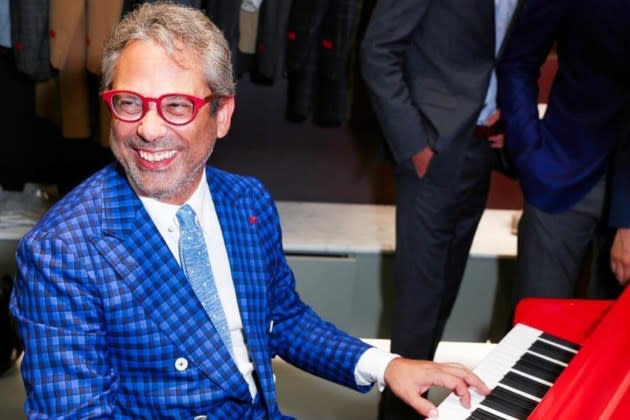
For Gianluca Isaia, experience matters.
He doesn’t tout much his own experience, as chief executive officer for two decades of Isaia, his family-owned luxury menswear firm based in Naples, Italy. More so, it’s about the experience in the four-wall setting of a store, and its service and amenities. Something refined, something timeless.
More from WWD
“I don’t think any of our customers needs another jacket or a suit or a shirt,” Isaia said. “Many customers come not just to buy, but maybe to have a drink with us. They come because they find pleasure spending time in our stores.” It helps that each of Isaia’s 20 stores has a piano and full bar for drinks. They’re not just for show.
“We started e-commerce a few years ago. It’s not a huge business for us. Our customers prefer to come to our stores and spend time with us.”
Isaia’s 10,000-square-foot showroom in New York is also an experience, with a spacious lounge-like area with, of course, a bar and a red piano, separate from the showroom and offices.
Gianluca Isaia enters wearing a checked green-and-blue suit, and the vivid red-framed glasses he always has on. “It’s my signature,” he said. “I sleep with the glasses. No. I’m joking.” The glasses and piano evoke Isaia’s brand logo, a recognizable tiny red coral, which is a good luck charm in Naples.
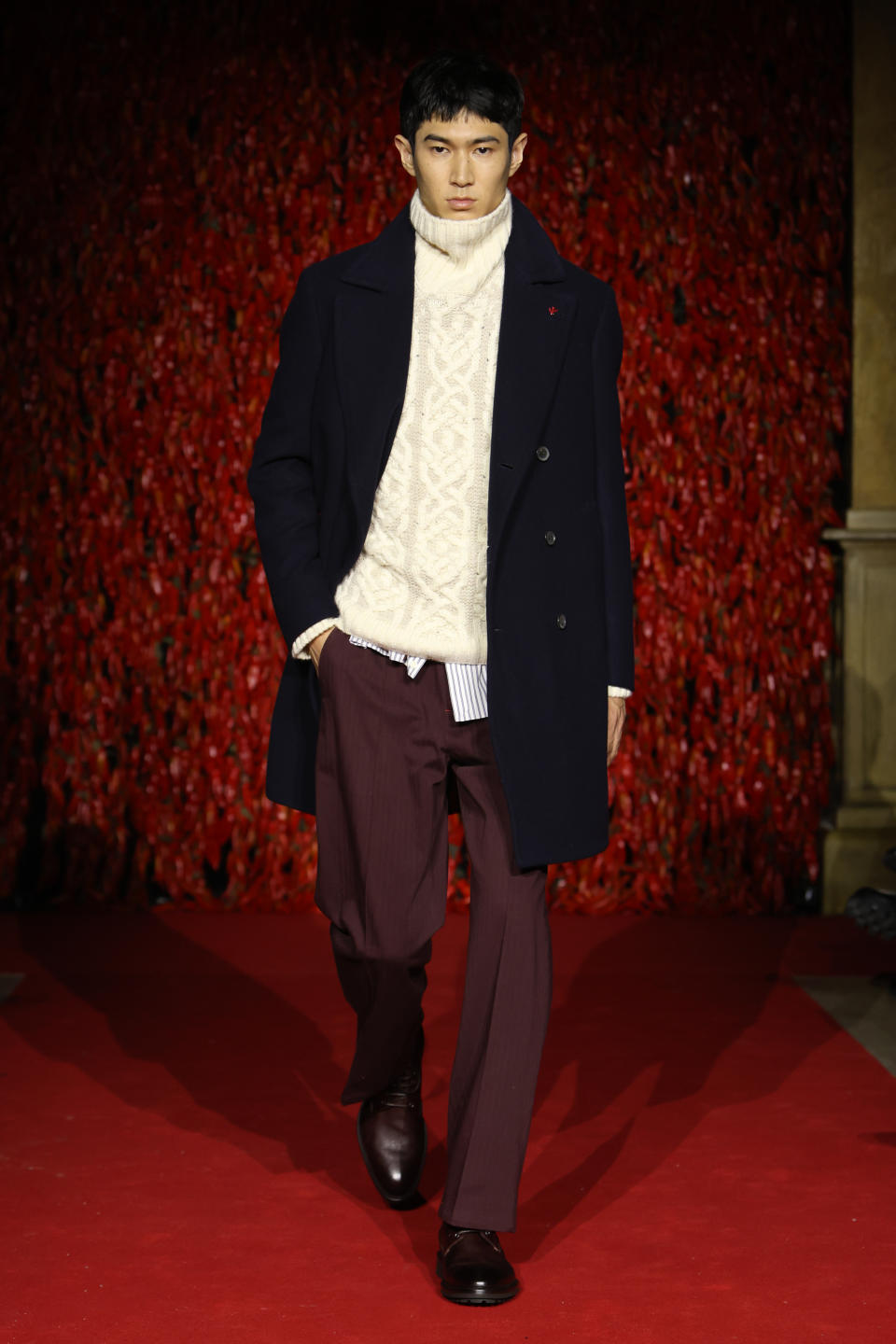
Over a cappuccino, Isaia seems more the welcoming, easygoing, affable host, rather than a CEO eager to talk business, though there’s nothing relaxed about his approach to his brand. “We take our craftsmanship very seriously, but we don’t take ourselves too seriously,” he said.
The Isaia company was founded in the 1920s by Enrico Isaia as a fabric shop known for working with renowned tailors. Eventually, he set up a small workshop next door for creating handcrafted men’s tailored clothing.
Under Enrico’s son Gianluca, the tradition of impeccable Neapolitan tailoring is sustained while being updated with contemporary fabrics, styles, cuts and expressive colors and checks. Between the tailored clothes and the sportswear, hundreds of items are offered each season. For fall 2024, the collection was an homage to the “New Napoli” movement to revitalize the arts scene of the city. The Neapolitan actor/director Massimo Troisi and the performer’s film, “Morto Troisi, Viva Troisi,” was the inspiration.
“The company has changed a lot in the last 10 years,” said Gianluca Isaia, who, prior to joining the family business in 1989 as commercial director, studied economics in Milan.
“Before, we were just a wholesale business, with 95 percent of our business with the Italian market and 5 percent abroad. Today, it’s just the opposite — 5 percent with Italy and 95 percent abroad. The U.S. is our main market,” representing 60 percent of the volume. Fifteen years ago, the private label operation was discontinued, but growth has continued since then.
“Even if COVID was terrible, for us it was a big opportunity. We decided to internalize all the sportswear,” meaning bringing production of the outerwear, leathers, jerseys, T-shirts, polos, denims and sport pants in-house to the Isaia factory in Naples. (The tailored clothes have always been produced in-house.)
“Before we were picking the fabrics and creating the models, but producing outside our factory,” Isaia said. “By producing in-house, the quality is raised, there is more opportunity to create prototype styles and offer made-to-measure in all the in-house categories. I like a big collection,” said Isaia. There are also faster deliveries to retailers, he added. In May, Isaia will begin to produce all of its knits in-house; jersey knits were already in-house.
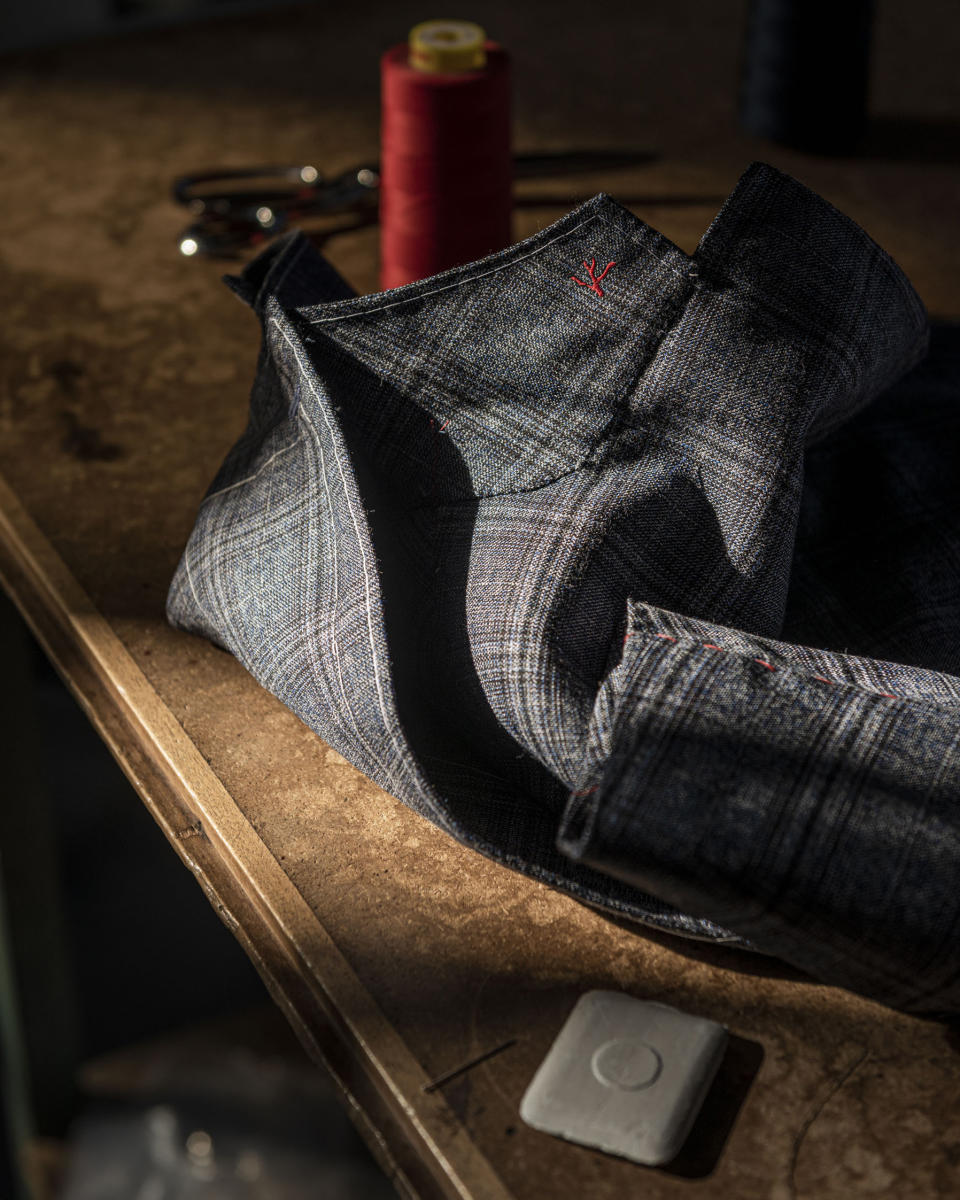
In January, Isaia relaunched footwear, though that’s not produced in-house. “Classic-styles shoes are coming back, as the sneaker trend fades,” he said.
Also during COVID-19, “We tried more e-commerce, but the best decision was to open more retail stores,” Isaia said. “Many people thought that was crazy at the time. The investment was quite big but it was something we decided so we could be ready when COVID was over. Of course, we didn’t know how long the pandemic would last so the risk was quite high but we opened five stores, in Chicago, Miami, Toronto, London and Saint Moritz. 2022, when COVID ended, was our best year. 2023 was even better.”
He said the company in 2023 had an EBITDA (earnings before interest, taxes, depreciation and amortization) margin of 20 to 21 percent, and last year generated 85 million euros in volume, up from 77 million euros in 2022.
Isaia continues to advance the brick-and-mortar agenda. A store on Worth Avenue in Palm Beach, Fla., next to Chanel, will open by late summer or early fall this year. “We would like to open another two or three stores this year possibly,” Isaia said, citing Paris, Dallas, Las Vegas and Chicago as being eyed.
Last year Isaia opened its second concession, a 1,300-square-foot shop inside Saks Fifth Avenue in Manhattan. The first opened in Harrods three years ago. He said additional concessions could open provided the first two show steady success.
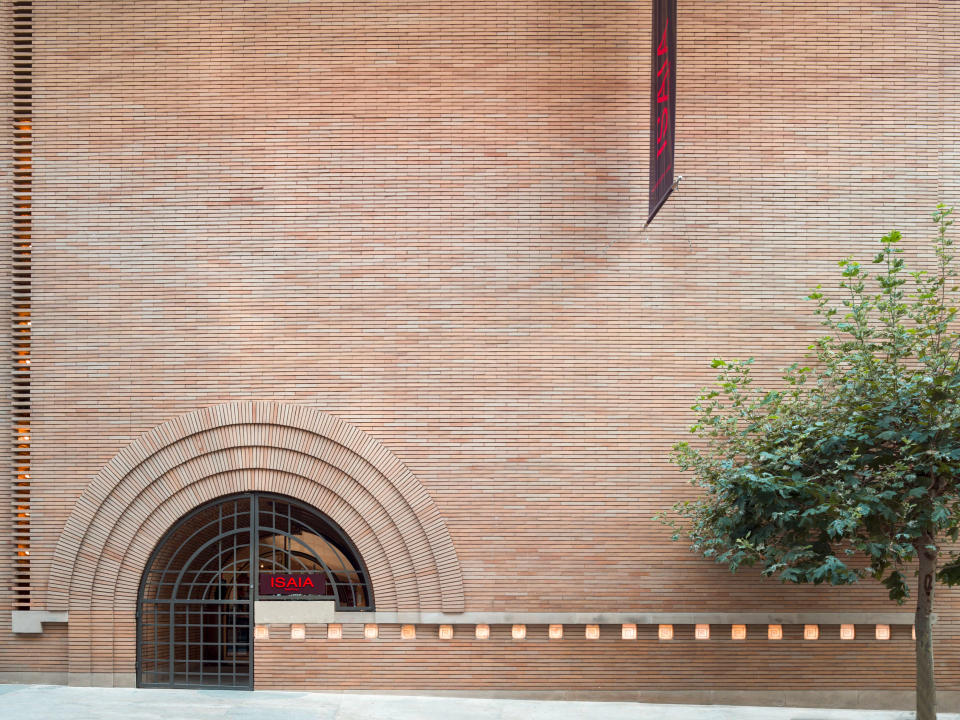
“Having direct retail gives you the opportunity to be in direct contact with the consumer and treat them with special service every time,” Isaia said. “It’s very important to have personal relationships with luxury consumers. They’re looking for a personal relationship,” something they don’t always get in a department store setting.
“The market is strange in this moment for department stores. Department stores all over the world need to reinvent,” he said.
Isaia’s key department store accounts are Neiman Marcus, Saks, Harrods, Lane Crawford in Asia, Oger in Amsterdam, and Beymen in Turkey. Key specialty store accounts include Mitchells, Stanley Korshak, Mario’s, and Silver Deer in Mexico.
“Right after COVID, everybody wanted to travel and spend,” Isaia recalled. “In 2023 luxury didn’t stop selling but it wasn’t as accelerated as 2022. I think 2024 will be the same as 2023. That’s why it’s important to have a personal relationship and direct contact with the consumer.”
One of the challenges, the CEO explained, is to convince the luxury consumer that a luxury product is essential, when in actuality it’s a non-essential for those that have everything already. “You have to create the need,” Isaia said. “A need they might not know they have — a made-to-measure jacket, a personalized label embroidered with your name, and a hanger with your name too. This is something we started a few years ago, something the customer was not necessarily expecting, a need they didn’t know they had. Now it’s normal to receive the label and the hanger [bearing] your name. It’s our strategy to anticipate one’s need and provide a surprise.”
Like a drink at the Isaia bar perhaps. “We had one guy from Los Angeles who spent six nights in Capri and for five of them visited our store there. He would go to dinner and come to the store after.”
Asked what’s selling best lately, Isaia cited sport jackets, generally priced $5,000 to $7,000, and items with checks and colors. “We are really famous for our colors,” he said. He also cited 100 percent cashmere and cashmere-silk blended knitwear, priced $2,500 to $3,000.
He characterized the Isaia prices as expensive but not crazy expensive. “The luxury customer is paying much more attention to what he is buying. He’s not buying something from a brand because he saw it on someone else. They want more and more to understand the quality. A lot of our customers ask to visit the factory. They want to see why the product has so much quality, to see how we produce. We bought a mill in Italy four years ago just before COVID where we are making most of our exclusive fabrics. The luxury guy also wants to see the mill, to see how the yarn converts to a fabric.”
A few years ago, “I got very close a with one of the biggest hedge funds in the world” to sell the company, said Isaia, who is 61. “But in the end I said to myself, I have three children — my two children and the company is another child for me. I cannot sell my child. Even if they wanted me to stay involved and manage, I said I’m not in a hurry,” to sell.
“I can say I only worked a few days in my life. All the other days it was just a pleasure to wake up and go to work. This is what I try to tell my children. Don’t feel you have to follow me. My daughter [Andrea Chiara] just started with me, in the communications department. I want them to feel free. I want them to do what they really love.
“I would like to open a little hotel in Capri. It’s a huge dream and maybe in a few years a reality. I would not be doing it for business. It would be for me. I love to be the host, in my way.”
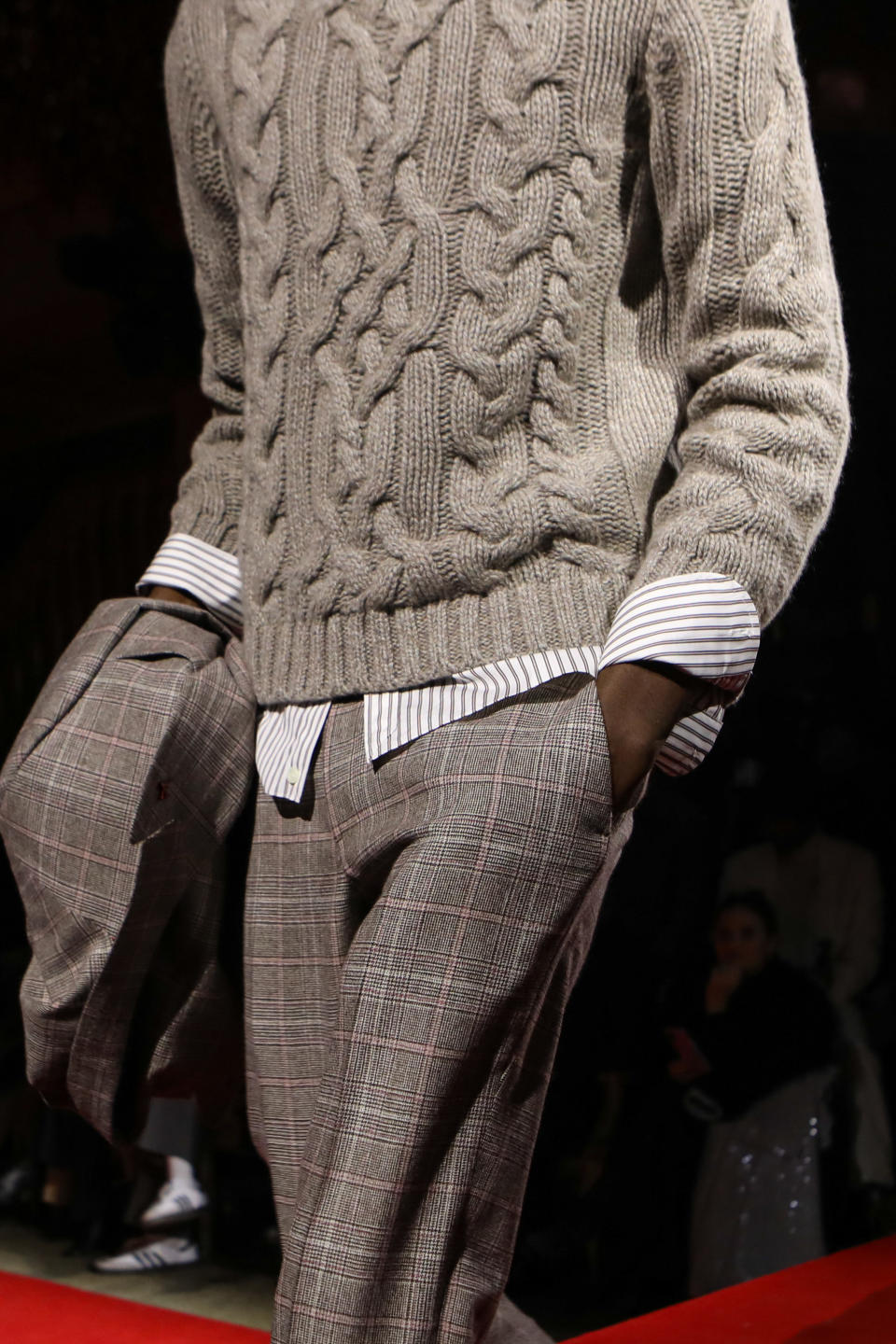
From the fall 2024 Isaia collection. Photo by Bakerstreet Studio.
Best of WWD

